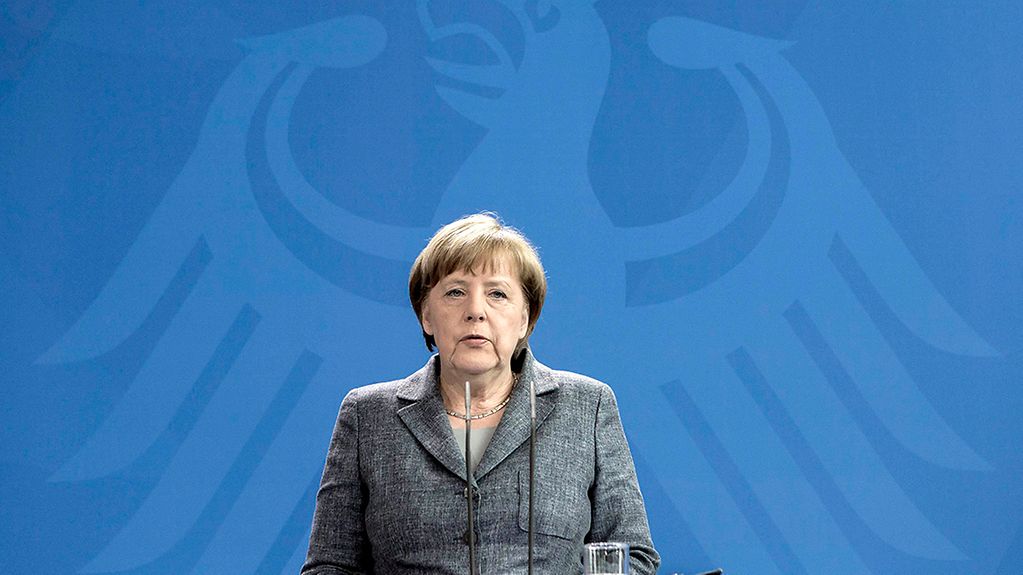Jan Böhmermann’s poem
The German government is to allow a criminal inquiry in the case of satirist Jan Böhmermann, announced Chancellor Angela Merkel in Berlin. In a constitutional state based on the rule of law, like Germany, it is up to the courts, she said, to weigh up personal rights and press freedom.
3 min reading time

We are convinced of the strengths of the rule of law, says Angela Merkel
Photo: Bundesregierung/Koall
At the Federal Chancellery, Chancellor Angela Merkel stated that Germany has close and cordial relations with Turkey. Turkey is a partner within NATO and is conducting accession negotiations with the EU. Within this partnership "mutual respect, as called for by international law, is particularly important, as is open dialogue on developments in the rule of law, the independence of the courts and pluralism of opinion."
In the television programme "Neo Magazin Royale" on the German channel ZDF, satirist Jan Böhmermann read a poem on 31 March, which was billed as a "Schmähgedicht", or a poem deliberately designed to cause offence, criticising Turkish President Recep Tayyip Erdoğan. In response, the Turkish Embassy sent a note verbale to Germany’s Federal Foreign Office. As federal government spokesperson Steffen Seibert explained on 11 April at the government press conference, this was a formal request from the Turkish side that a criminal prosecution be brought. Turkey has based this request on Section 103 of the German Criminal Code, which makes it a criminal offence to insult a foreign head of state. The German government had to decide whether or not to allow the office of the public prosecutor to investigate in this case.
Freedom of the press is elementary in a state under the rule of law
This increases the concern of the German government regarding the situation of the media in Turkey, the fate of individual journalists and the restrictions placed on the right to demonstrate. The German government is working at international level to ensure that fundamental rights are respected, including freedom of opinion, artistic freedom and freedom of the press. "We expect Turkey to respect and protect these rights as well," said Angela Merkel.
[video]
The German government expects this, because it is convinced of the strength of the rule of law, stressed the Chancellor. In a state under the rule of law, freedom of opinion, artistic freedom and freedom of the press are essential basic rights. The rule of law also guarantees those affected procedural rights and ensures that every person is presumed innocent in front of the law until proven guilty.
German government allows the judiciary to examine the case
In a state based on the rule of law it is "not up to the government but up to the office of the public prosecutor and the courts to weigh up personal rights and other concerns affecting press and artistic freedom," continued Angela Merkel. By allowing criminal investigations to be conducted into the case of Jan Böhmermann, she explained, the German government is merely authorising the independent judiciary to examine the case. It is in no way a prejudgement or a decision on the limits of artistic freedom, freedom of the press and freedom of opinion.
Section 103 to be repealed
Angela Merkel also announced that in the view of the German government, Section 103 of the German Criminal Code is unnecessary for the future. The provisions of this section protect the personal honour of foreign heads of state. The German government will be moving to have the section repealed by the German Bundestag by 2018.
Section 103, German Criminal Code: Defamation of organs and representatives of foreign states
(1) Whosoever insults a foreign head of state, or, with respect to his position, a member of a foreign government who is in Germany in his official capacity, or a head of a foreign diplomatic mission who is accredited in the Federal territory shall be liable to imprisonment not exceeding three years or a fine, in case of a slanderous insult to imprisonment from three months to five years ...
Since the Second World War this article has rarely been used. Before courts can apply the provisions it must be ascertained that a comparable legal provision exists in the other state and the German government must approve a criminal enquiry.